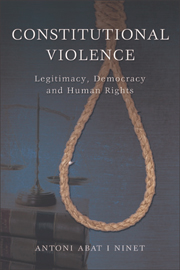1 - Introduction
Published online by Cambridge University Press: 05 August 2013
Summary
This book is the result of an extended process of thinking that began with the draft of my paper ‘Playing at being Gods’.
After this work I started to focus my interest on the main issues addressed in this book: constitutional legitimacy and the relationship between democracy and constitutions. The topics analysed in this book emerged progressively as a consequence of thinking about the preceding issues. The first question to be developed, constituting the opening premise, was that of the origins and influences of the religious discourse in the configuration of the modern constitutional system. Particularly important were the sacred conception of the US Constitution and the expansion of this phenomenon to the rest of the world's modern constitutions.
The drafters of the US Constitution consciously played the role of a civil God; the US Supreme Court developed the role of secular prophets; the Constitution was the sacred tablets; and the people of the United States became the chosen people. As the law was received by Moses on the tablets, so too did the Constitution adopt a legal, moral and religious character. This sort of metaphysical phenomenon and full authority was sought deliberately by the Founding Fathers and the drafters of the US Constitution, to obtain the kind of sovereignty and power that they needed. The new fundamental norm of the state came outfitted with a sort of undisputed legitimacy, an almost divine authority.
- Type
- Chapter
- Information
- Constitutional ViolenceLegitimacy, Democracy and Human Rights, pp. 1 - 7Publisher: Edinburgh University PressPrint publication year: 2012



